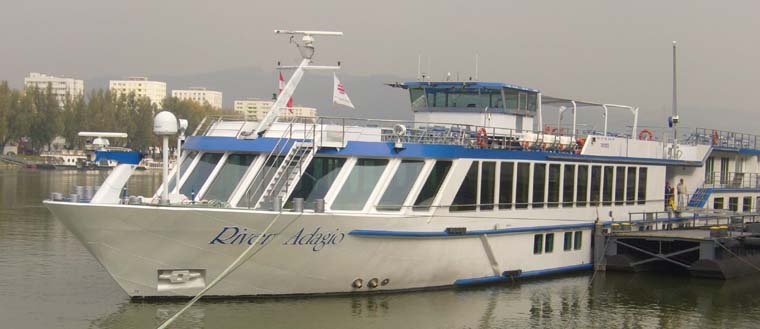|
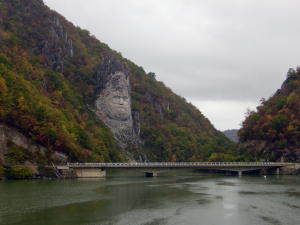 On
our way from Serbia to Bulgaria we spent the day cruising the Danube
through a section known as the Iron Gates. This used to be a narrow
and treacherous section of the river with whirlpools and rapids.
To raise the level of the river and tame it, the Communists built
a series of hydroelectric dams with an agreement between Romania
and Tito in Yugoslavia. On
our way from Serbia to Bulgaria we spent the day cruising the Danube
through a section known as the Iron Gates. This used to be a narrow
and treacherous section of the river with whirlpools and rapids.
To raise the level of the river and tame it, the Communists built
a series of hydroelectric dams with an agreement between Romania
and Tito in Yugoslavia. 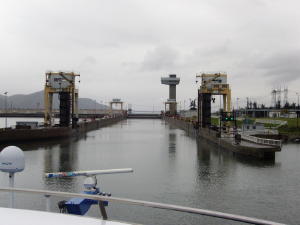 A
huge lock (iron gate) drops the ship 90 ft. in 2 stages. A
huge lock (iron gate) drops the ship 90 ft. in 2 stages.
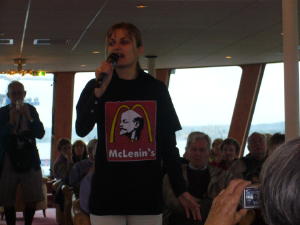
The time "at sea" was a great opportunity to learn more
about life under communism from our program directors. Each was
from a different country - Hungary, Bulgaria, Croatia and Romania
and each spoke to us about growing up during that time. They summarized
life under Communism with the following:
The Paradoxes of Communism
Everybody has a job but nobody works.
Even though nobody works, the 5 year plan is fulfilled 110 percent.
Even though the five year plan is fulfilled 110 percent, there is
nothing in the stores.
Even though there is nothing in the stores, people have everything
they need.
Even though people have everything they need, they keep stealing.
Even though people keep stealing, nothing is ever reported stolen.
According to our program directors, one of the positive aspects
of communism was there was a lot of time to socialize - both at
work and at home. Children were given a good education with lots
of sports programs and music. However religion was in competition
with communism so people were encouraged not to go to church - especially
teachers (as they could influence the children). All land and businesses
became nationalized. Everyone had the same things in their houses
- there was no choice of brands. In Romania, there were food lines,
with people standing for hours to get a loaf of bread or a pair
of shoes - whatever was being handed out that day. America was portrayed
as a bad place to live with lots of crime and high unemployment.
The older generation (parents of these program directors) actually
liked it better under communism. It was very hard on them after
communism fell - hard to find jobs, higher prices. But it has only
been 17 years since the fall - just ½ generation - and it
will take more time to see the positive aspects of the change.
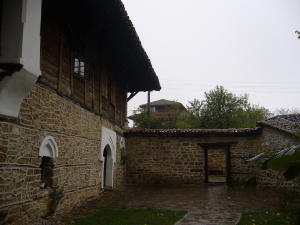 We
docked in Ruse, Bulgaria but did not tour the city. Instead we went
by bus to visit the old towns of Arbanassi and Veliko Tarnovo. Arbanassi
is an architectural reserve and one of the most historic villages
in Bulgaria. During the 17th and 18th centuries, wealthy merchants
lived under Turkish rule. But to protect their property from bandits,
their houses looked like fortresses. We
docked in Ruse, Bulgaria but did not tour the city. Instead we went
by bus to visit the old towns of Arbanassi and Veliko Tarnovo. Arbanassi
is an architectural reserve and one of the most historic villages
in Bulgaria. During the 17th and 18th centuries, wealthy merchants
lived under Turkish rule. But to protect their property from bandits,
their houses looked like fortresses. 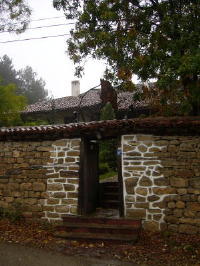 We
visited an Orthodox church which looked like a normal house from
the outside because the Turks forbad religion. Inside, the walls
and ceilings were totally covered with frescos of the saints, the
virgin Mary and Jesus. In the Orthodox service, there are no musical
instruments and everyone stands. Priests must be married and attend
a theological university to have a parish. Monks may not marry.
During our visit to the church, a quartet gave us a beautiful concert
of old Slavonic chants. The rounded walls of the church provided
wonderful acoustics for the concert. We
visited an Orthodox church which looked like a normal house from
the outside because the Turks forbad religion. Inside, the walls
and ceilings were totally covered with frescos of the saints, the
virgin Mary and Jesus. In the Orthodox service, there are no musical
instruments and everyone stands. Priests must be married and attend
a theological university to have a parish. Monks may not marry.
During our visit to the church, a quartet gave us a beautiful concert
of old Slavonic chants. The rounded walls of the church provided
wonderful acoustics for the concert.
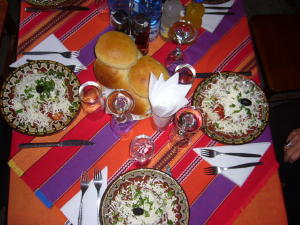
Lunch was in an old tavern where we had a delicious salad of home
grown cucumbers, tomatoes, roasted peppers, onions and the famous
Bulgarian feta cheese. This was followed by a veal stew and a yummy
rum sponge cake (we got the recipe).
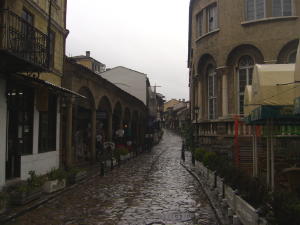 The
old town of Veliko Tarnovo was the first capital of Bulgaria during
the 12th-14th century. Its winding, narrow streets are home to a
variety of artisans. One of the things Bulgaria is famous for is
the Damask Rose. Petals are picked in May, starting at 4am while
the dew is still on them. It takes 2000kg of petals to get 1kg of
rose oil. The
old town of Veliko Tarnovo was the first capital of Bulgaria during
the 12th-14th century. Its winding, narrow streets are home to a
variety of artisans. One of the things Bulgaria is famous for is
the Damask Rose. Petals are picked in May, starting at 4am while
the dew is still on them. It takes 2000kg of petals to get 1kg of
rose oil.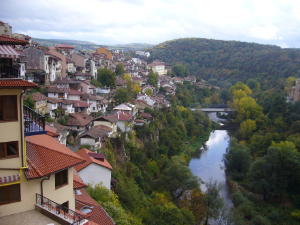
Bulgaria was finally able to join the European Union in January,
2007. During the 1990's it was wracked with political instability
and economic crisis. Before the war, people primarily live in small
villages as farmers. But after the war, they moved to the cities.
Unemployment is over 8% and job salaries are very low - about $210/month.
Corruption in government is still a huge problem and may cause Bulgaria
to be dropped from the EU if not stopped.
To view more photos from our visit to Arbanassi and Veliko Tarnovo,
go to the Bulgaria Photo Gallery.
Home
Locations Visited Photos Map
Contact Us
|
